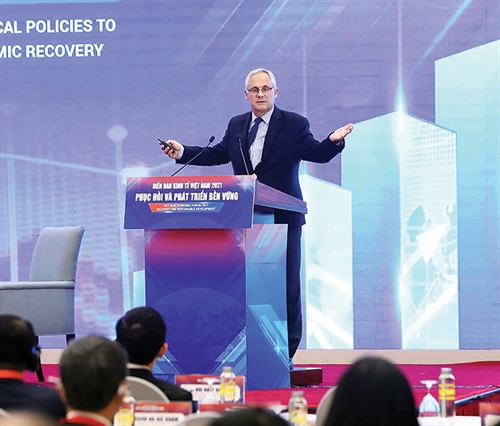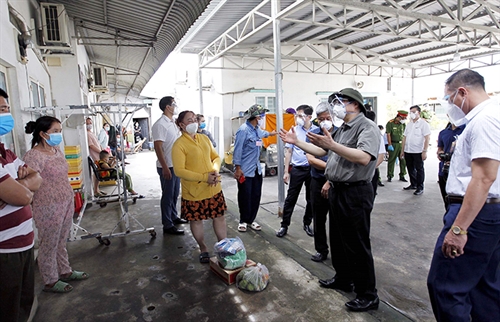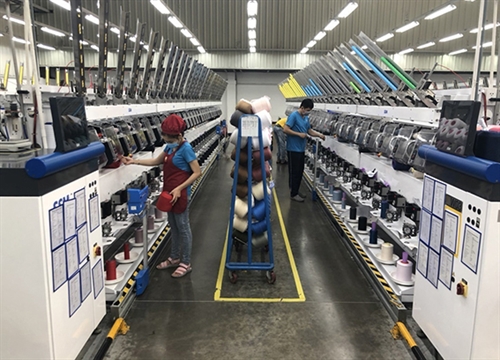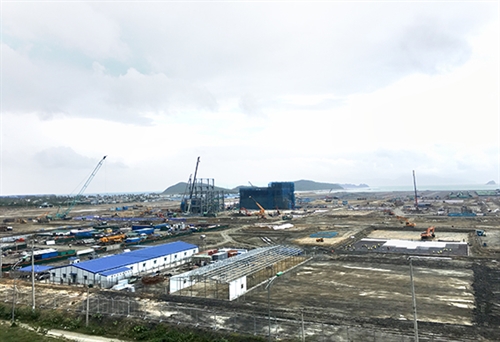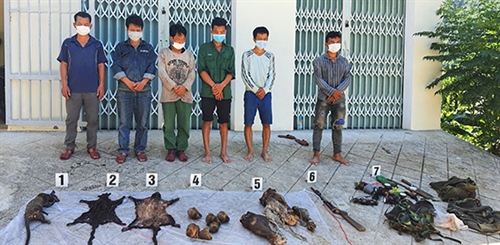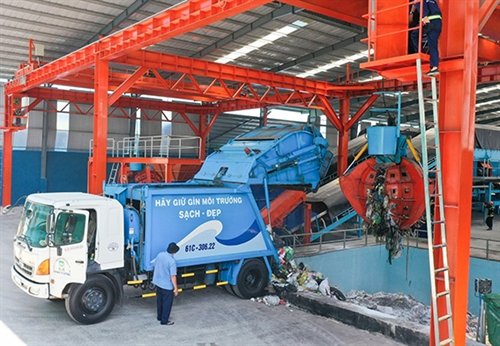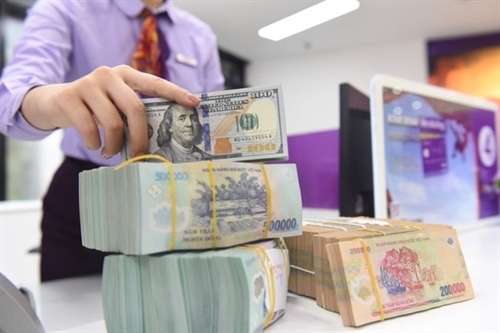The Fourth Industrial Revolution has led to emergence of new business lines based on digital platforms following the model of sharing economy (Grab, peer-to-peer lending, ride and accomodation sharing, etc.). However, enterprises engaged in such business lines are encountering numerous difficulties due to incompleteness of the existing legal framework concerning this issue. This article brings an insight into the realization of the right to freedom of enterprise in the sharing economy in Vietnam and gives recommendations for promoting the development of this model in the country.
Chu Thi Hoa, LL.D.
Deputy Director of the Institute of Legal Studies
Ministry of Justice
Right to freedom of enterprise under Vietnam’s law
The right to freedom of enterprise is enshrined in the 2013 Constitution of Vietnam (the Constitution) as a big progress compared to the previous Constitutions with a fairly inclusive provision: “Everyone has the right to freedom of enterprise in the sectors and trades that are not prohibited by law”[1]. The Constitution also states: “Human rights and citizens’ rights may not be limited unless prescribed by a law solely in case of necessity for reasons of national defense, national security, social order and safety, social morality and community well-being.”[2] So, it can be understood that the right to freedom of enterprise is an “open” freedom and that the State should specify any sector or trade in which it wishes to ban citizens from doing business. This shows an evolutionary shift from the legal mindset of “closed” freedom, e.g., citizens may only do what is allowed by law, to that of “open” freedom, e.g., citizens may do everything that is not banned by law.
The Constitution also affirms that all economic sectors are equal in their operation, thereby helping create a breakthrough in the right to freedom of enterprise and equality in business activities among economic sectors. It says: “All economic sectors are important components of the national economy. Entities in different economic sectors are equal before law and shall cooperate and compete with one another in accordance with law.” It is also read in the Constitution: “The State shall develop and improve economic institutions, regulate the economy on the basis of respect for market rules.”[3] These provisions aim at affirming that the right to freedom of enterprise is a constitutional right and serve as a ground for concretizing this right in relevant legal documents.
Based on the Constitution, the right to freedom of enterprise has been institutionalized in the civil, enterprise and commercial laws[4], thus exerting great impacts on the business community. The two laws directly concerning enterprises, namely the Enterprise Law and Investment Law (both the 2014 and the 2020 versions), provide the right to freedom of enterprise in a manner inductive to simplifying licensing conditions and procedures, addressing limitations and irrationalities of previous provisions, and extending rights to self-determination of businesses[5]. The 2015 Penal Code has abolished the offense of illegally conducting business activities. By this, the State no longer criminalizes economic-civil relations, respects and guarantees the principle that the people and businesses may deal in anything not banned by law. The regulations on competition, resolution of civil, investment and business disputes, and handling of violations[6] have been significantly improved to better guarantee the right of the people and businesses to initiate legal lawsuits[7]. The regulations on dispute resolution[8] have been designed toward diversifying dispute resolution methods and ensuring freedom of disputing parties to choose such methods, upholding negotiation and mediation among them, and establishing a mechanism for courts to recognize successful mediation agreements for disputes resolved through negotiation or mediation. Legal counseling, public notary, and legal aid and assistance for businesses have also recorded positive developments, thus helping facilitate access to justice and legal risk management by the people and businesses.
In sum, the right to freedom of enterprise is concretized under Vietnam’s current law into the following rights:
(i) Right to freedom to choose business sectors or trades: Citizens may choose to deal in sectors or trades not banned by law, and conduct a single business line or multiple business lines. They may be engaged in conditional business lines as soon as they satisfy the conditions specified for such business lines;
(ii) Right to freedom to choose business models and scales: Citizens are free to decide on their investment capital amounts, provided they satisfy the condition on minimum legal capital levels specified for such business lines as gold trading, or provision of financial services or security services. Depending on the number of investors, methods and forms of raising investment capital, citizens may choose appropriate business models, such as business households, sole proprietorships, partnerships, limited liability companies, or joint-stock companies;
(iii) Right to freedom to choose fundraising forms and methods: Citizens are free to decide on increasing their loan or charter capital amounts, and raise funds through borrowing contracts or issuance of bonds or stocks;
(iv) Right to freedom of contract: Citizens are free to choose customers, and reach agreement with their customers on forms and contents of contracts;
(v) Right to freedom to choose dispute resolution forms and methods: Citizens are free to choose whether to have their commercial disputes resolved through negotiation, mediation, court hearing or arbitration; and,
(vi) Right to freedom of fair competition: Citizens are protected by law against unfair competition practices affecting their production or business activities.
The above provisions have laid down the foundation for recognition and protection of the right to freedom of enterprise of economic entities. This also serves as an important prerequisite for promoting business and commercial activities, thus contributing to the development of a socialist-oriented market economy.
From the aspect of competition, the Organization for Economic Cooperation and Development (OECD)’s 2018 Peer Reviews of Competition Law and Policy in Vietnam affirmed that the country has made a great deal of progress in its journey from a centrally planned, developing and socialist country toward a rapidly industrializing market economy. Successive waves of reforms have substantially reduced the size of the sector of state enterprises, improved governance and reduced competitive distortions[9]. From the aspect of investment, OECD evaluated that institutional reforms made in Vietnam’s legal system were positively progressive and appreciated by the business community at home and abroad[10].
 |
| Accommodation- and ride-sharing platforms like Airbnb and Grab have become popular in Vietnam__Photo: Internet |
Development of the model of sharing economy in Vietnam
The model of the sharing economy has emerged for a long time around the world. However, since the dawn of the Fourth Industrial Revolution with numerous scientific and technological achievements and information technology advances, this model has recorded development breakthroughs and become a core element of the present digital economy. The sharing economy is a new method of mobilizing, allocating, exploiting and efficiently using resources for economic development as business types operating after this model largely utilize available resources of users on a technology platform. Recently in Vietnam, the term “sharing economy” has drawn debates of many forums that touch upon business models based on digital technology applications. In Vietnam’s context, the sharing economy can be understood as a new peer-to-peer business model or an economic system in which property and services can be shared among a large number of users on the market thanks to the use of digital platforms.
In the world, businesses operating after the model of sharing economy have achieved enormous successes. Among them, Airbnb - providing home-sharing services for travelers, Uber - community taxis, and Kickstarter - raising funds by crowd, are prominent names.
In Vietnam, lease of infrequently used assets does exist though the sharing economy has not yet seen a boom and in fact the country always has a great potential for this model to develop[11]. Regarding policy responses, the Party and the State of Vietnam have backed and facilitated the development of the model of sharing economy through issuing legal documents regulating this model.
The first document to be cited is Prime Minister Decision 999/QD-TTg of August 12, 2019, approving the Scheme on promotion of the model of sharing economy, which aims at ensuring an equal business environment for both businesses operating after the model of sharing economic and those operating after traditional economy models. This move showed the Government’s recognition of new business forms based on utilization of unused resources in order to optimize such resources and promote economic activities with application of scientific and technological advances. This Decision has helped technology companies efficiently operate after the model of sharing economy, and created a common playground of fair competition between traditional companies and technology firms. The most important thing of this model is to bring about ultimate benefits for users.
The second text is Political Bureau Resolution 52-NQ/TW dated September 27, 2019, on a number of guidelines and policies on proactive participation in the Fourth Industrial Revolution. It sets forth the task of improving legal institutions to facilitate the participation in Industry 4.0 and national digital transformation, thus promoting the development of the model of sharing economy. This Resolution clearly states: “Formulating a management mechanism appropriate to the digital business environment, facilitating innovation; promulgating as soon as possible a regulatory sandbox for new technologies, products, services and business models created in the Industry 4.0; building testbeds for technology businesses following the world’s advanced models; and identifying, recognizing and establishing standards and technical regulations on, new products, technologies and business models.”.
Another one is Ministry of Justice Report 45/BC-BTP of March 17, 2021, on review of, and proposed solutions to improve, the civil law’s provisions on transactions, contracts, ownership, property rights and mechanism for resolution of disputes related to the model of sharing economy.
Exercise of the right to freedom of enterprise in the sharing economy
In addition to the fact that the Constitution and legal documents of Vietnam provide in a fairly specific manner the right to freedom of enterprise, the Vietnamese market has been rated as potential for development of the sharing economy. However, in the sharing economy, the realization of the right to freedom of enterprise in the country encounters certain problems.
Firstly, there remains a gap between the recognition of this right and guarantee of its exercise in reality.
Regarding the right to choose business sectors and trades, in principle, citizens may choose to do business in sectors and trades not banned by law. However, in practical law enforcement, this principle has not always been observed. Particularly, in the sharing economy, people usually find it difficult to register the establishment of businesses engaged in new business lines that are unfamiliar to state management agencies. Due to the fact that some of such business lines are not yet listed or identified, the licensing of operation of businesses operating after the model of sharing economy still faces various problems, particularly those caused by the lack of specific provisions regulating the sharing economy. In practice, such new business lines may be registered as “other services” or even considered ineligible for business registration. For example, business lines operated on the basis of digital applications as cryptocurrency trading and peer-to-peer lending have not yet been eligible for business registration in Vietnam[12].
With Decision 999, the Prime Minister has assigned ministries and sectors to develop an ecosystem for business and investment activities after the model of sharing economy, covering the task of formulating and proposing to the Government for promulgation a regulatory sandbox for new business lines in the sharing economy. However, a government decree on the regulatory sandbox for fintech activities in the banking service, which is drafted by the State Bank of Vietnam, is still in the pipeline.
As for the right to choose fundraising forms and methods, theoretically, business individuals or businesses are free to decide to increase their loan amounts through loan agreements or issuance of bonds or increase their charter capital amounts. However, how to raise funds for innovative startups operating after the model of sharing economy remains legally unregulated. In other words, innovative startups would encounter numerous difficulties in raising funds through traditional channels, e.g., borrowing bank loans. Therefore, they may consider raising funds from angel investors, venture capital funds or through initial coin offering (ICO)[13], initial exchange offering (IEO), security token offering (STO), etc. Unfortunately, to date, these fundraising channels have not yet been legally recognized in Vietnam.
Secondly, the way of thinking that anything that cannot be managed should be “banned” has hindered the exercise of the right to freedom of enterprise in the sharing economy.
At present, investors’ ownership of various types of cryptocurrency as assets is highly risky for it is not protected by law. That’s why the State Bank recommends organizations and individuals to refrain from investing in, holding and conducting transactions related to cryptocurrencies and prohibits credit institutions from using cryptocurrencies as money or payment instruments when providing services to their clients despite the fact that such cryptocurrencies are currently traded on the free market.
Without a regulating legal framework, all cryptocurrency-related investment, trading and fundraising activities in Vietnam fall beyond the management by state agencies, leading to the emergence of such criminal acts as illegally raising funds, swindling and misappropriating assets of entities and people that lack legal and technical knowledge about this sphere[14]. To address this, on August 27, 2018, the Prime Minister issued Decision 1225/QD-TTg approving the Scheme on improvement of the legal framework for management and handling of virtual assets, e-money and virtual currency. Under this Scheme, the improved legal framework on virtual currency would help protect lawful rights and interests of domestic and foreign investors in Vietnam, effectively prevent and control related risks and abuses, and concretize the 2015 Civil Code’s provisions on property rights in the field of virtual assets, e-money and virtual currency. Regrettably, to date, no legal document to this effect has been enacted.
Thirdly, competitiveness of legal institutions on the right to freedom of enterprise in the sharing economy remains low, and policy responses are not flexible enough to catch up with developments of the market economy, especially in the application of new business models as well as new technological advances brought about by the Fourth Industrial Revolution, failing to create a trustworthy legal framework for innovative startups[15]. Low competitiveness of legal institutions on the right of freedom of enterprise in the sharing economy of Vietnam might lead to an unwanted reality that many Vietnamese enterprises would choose to start up their business in another country, such as Singapore, with more flexible institutions to facilitate innovative startups[16].
Conclusions and recommendations
The above analyses reveal some limitations of Vietnam’s legal framework on the right to freedom of enterprise regarding new business sectors and trades and innovative startups which should be addressed in order to create a favorable and safe environment for business investment activities. Regulations on the right to freedom of enterprise in the sharing economy should be improved to get the best of opportunities brought about by the scientific and technological revolutions.
Firstly, the provisions on business conditions and operation of businesses in the Enterprise Law, the Investment Law and guiding texts should be revised toward facilitating business registration and operation. They should be based on the viewpoint that businesses can do anything not banned by law so that they can take every business opportunity, especially in new business lines in the sharing economy that are not yet listed in accordance with law (e.g., peer-to-peer lending), and facilitate pilot licensing of these business lines.
Secondly, the right to freedom of enterprise should be recognized together with legal guarantee for the exercise thereof by business entities.
Thirdly, the legislative way of thinking should be more “open” and flexible so that policymakers can go side by side with innovative startups. For unmanageable or unclear matters, there should be a regulatory sandbox, especially for application of new technologies in the sharing economy. Greater attention should be paid to relaxing traditional business conditions and lowering barriers concerning market entry and operation of innovative startups with a view to facilitating their trial operation and eventually improving technologies and meeting management requirements. In the context that the legal framework usually lags behind reality, permission for application of a regulatory sandbox is a proper policy response of state agencies to new technologies.
Finally, legal institutions on the right to freedom of enterprise in the country should be more competitive so as to help generate a driving force for Vietnam to become a startup and fintech center in the region and the world.-
Article 5 of the 2020 Investment Law reaffirms the right to freedom of enterprise: “Investors may conduct business investment activities in sectors or trades not banned by law. For conditional business investment sectors or trades, investors must satisfy business investment conditions specified by law” and “Investors may decide by themselves on and take responsibility for their business investment activities in accordance with this Law and relevant regulations.”.

